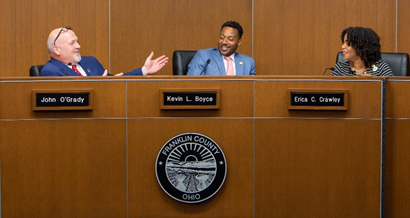HAPPY NEW YEAR, FRANKLIN COUNTY!

Hello and Happy Holidays to our Franklin County residents. This year and last have posed unique challenges to our community, families, and to county government. We are also presented with new opportunities, however, so thank you for taking the time to catch up on everything that has been going on at the Franklin County Board of Commissioners this year and everything that we have planned for 2022.
The focus for us commissioners this year has been about doing everything we can to help our residents who are still feeling the economic and health effects of the pandemic. To that end, we made millions of dollars available in mortgage and rental assistance and other efforts to help keep struggling families in their homes and to help young people find stable housing of their own. We also started a new Family Stabilization Unit to help shepherd vulnerable families though the social safety net system to ensure that they are getting the support they need to get ahead.
We invested heavily in our community this year through the non-profits and other community agencies that serve our residents every day, and with a historic new investment at the Mid-Ohio Food Collective. We focused on some of the most vulnerable members of our community, children and teens, and launched a new Women At Work initiative to help women get back to the workforce after the pandemic. Other community-based initiatives this year provided assistance to struggling minority-owned businesses, which got a disproportionately small amount of federal pandemic assistance, and supported residents who are returning to the community from incarceration in order to help them succeed and avoid further contact with the criminal justice system.
Some of the work that we’re most proud of this year has been focused here in the Board of Commissioners office. Last year, we codified Racial Equity as one of our core principles of good governance and then hired a new Chief Economic Equity and Inclusion Officer. We also expanded paid family leave for our employees, safeguarded the county’s top-tier credit rating, created a new website to track how we’re using the American Rescue Plan to help our county recover, and won awards for our diversity and inclusion efforts. You can read about these and other accomplishments in our annual State of the County report.
The biggest news of 2021, however, has to be the retirement of our long-time colleague, Marilyn Brown, and the appointment of our newest commissioner, Erica C. Crawley. Erica has already brought a new energy to our team as well as exciting new ideas and a real sense of urgency to help our residents. We can’t wait to see everything that she will accomplish in her new position.
Thank you again for taking the time with our Commissioner Connection newsletter. We wish all of your families a happy holiday season and healthy new year.
TRACKING THE AMERICAN RESCUE PLAN
 Congress passed the American Rescue Plan last March and the president signed it, enacting a sweeping package of assistance to help speed the country’s recovery from the COVID-19 pandemic. The American Rescue Plan, or ARP, builds on many of the funding measures in the previous year’s CARES Act, and will provide $350 billion in emergency funding to local governments, as well as direct support to families, tax credits for children, emergency rental assistance, small business support, and more. In all, Franklin County will receive $256 million to help our community recover.
Congress passed the American Rescue Plan last March and the president signed it, enacting a sweeping package of assistance to help speed the country’s recovery from the COVID-19 pandemic. The American Rescue Plan, or ARP, builds on many of the funding measures in the previous year’s CARES Act, and will provide $350 billion in emergency funding to local governments, as well as direct support to families, tax credits for children, emergency rental assistance, small business support, and more. In all, Franklin County will receive $256 million to help our community recover.
The first half of the money has arrived, and the commissioners have already begun putting it to work for Franklin County residents. They began by holding a public hearing at which they solicited opinions from the community about how they can best use the funding to speed the recovery. Then they created a new website where residents can track the funds to see how it’s being used.
At Recovery.FranklinCountyOhio.gov, residents can learn all about the American Rescue Plan, the input the commissioners received about how to use the money, submit their own feedback, track the spending by category, and read about the individual county resolutions putting these funds to work for us.
SPOTLIGHT ON A COUNTY EMPLOYEE—Commissioner Erica Crawley

This year has seen some unexpected changes in the commissioners’ office. Commissioner Marilyn Brown retired from the board in May, and Commissioner Erica C. Crawley was sworn in in July. In her five and a half months on the board, Commissioner Crawley has dived headfirst into the business of being a commissioner, meeting with leadership from throughout the county and keeping up a frenetic pace in the community. As the year winds down, she was kind enough to take a few minutes out of her schedule to talk with us.
Thanks for taking the time to talk with us, Commissioner. Please start by telling us a little about yourself and how you came to be in this new role.
Of course. I’m from Youngstown originally, so an Ohioan at heart, though I moved around a lot for a while after high school. I served active duty in the Navy from 2000 to 2003, then lived in Georgia for a while working for the Black Child Developmental Institute. Later I worked for the YMCA and the Cuyahoga County Department of Job and Family Services. I went to college at Cleveland State to get a bachelor’s degree in Criminology with a focus on juvenile delinquency so that I could work on disrupting the preschool to prison pipeline. Then I went to law school at Capital. I never planned to run for office, but the opportunity presented itself and I ran for state representative to represent the 26
th Ohio district in the southeastern part of Franklin County. We were in the minority in the Ohio Statehouse, so it was a tough place to affect much change, but I got to work with the county some and see the good work that was happening there. When the opportunity to serve with the board of commissioners came up, it felt like a good chance for me to make a bigger difference.
You have served in several capacities, in the navy and in state government, and now as a county commissioner. Do you feel drawn to service and why is service important to you?
My great aunt Marvel Flint instilled a great sense of service for me early on in my life. She was so active in church and in her community, and she always adopted families who needed some extra help, working to get them groceries or clothes or Christmas gifts, whatever they needed. She lived by, and I try to live by, the Muhammad Ali quote that “Service to others is the rent you pay for your room here on earth.” So, my work here isn’t about Erica. Leaving the community better than I found it is my rent to pay.
One of your really big focuses is on infant and maternal healthcare and other birth-to-five-year-old initiatives. Why is that?
Lived experiences. Everything people see about me is due to my own experiences. I had a traumatic pregnancy, and my concerns during that time were dismissed. That’s an experience that many Black women have had and continue to have—their health isn’t prioritized and their wishes and worries aren’t taken seriously, and the consequences are disastrous. Ohio’s infant mortality rate is awful, so that was something I wanted to work on when I became a state representative. I focused on moms as a way to help improve outcomes for the kids. Studies show that early investments in birth-to-five initiatives pay dividends for many years to come by helping young people to grow up to be productive adults, reducing incarceration rates, and in so many other ways.
You’ve been on the board for some time now, and have seemed to be both super engaged with the details of county government and also really active in the community. Do you always keep such a busy and fast-paced schedule?
No, but being in the legislature required it. My district was one of the poorest and the people there needed a really strong advocate, so I felt like it was my responsibility to be really engaged with them and for them. I’ve kept that up on the Board of Commissioners, but I’m really an introvert at heart even if you can’t see it.
What does a typical day look like for you now?
I usually start at nine a.m. with meetings, either our General Session or Briefing meeting, or a breakfast meeting. I usually have lunch and dinner meetings too, with briefings in between.
I’m also a single parent with all of the obligations that come with that, and I’m always responding to email and phone calls. It’s really important to me to be accessible to our residents, but that’s a bigger and bigger challenge. There’s really no balance. I just try to do the best I can.
What has surprised you about being a county commissioner, or what do you love or hate about the job?
I don’t hate anything about this job! This is the best job. I serve with great people: the other commissioners, county administration and our whole team who live their roles as public servants, and it’s so much easier to accomplish things here than it was at the statehouse.
I wouldn’t say that it surprises me, but I am still getting used to the breadth and depth of everything we do at the county. We really are the social safety net and provider of last resort for a lot of people who rely on us.
You have two daughters who are young adults. What advice do you give them or would you give to another young person starting out in the world?
I would say that it’s great to have goals and dreams and to work toward those, but you should also allow yourself to be flexible and see what happens. You never know what twists and turns life will give you, and it’s good to consider those as they come. I would never have expected to be here, but I wouldn’t trade it now for the dreams I used to have.
I would also tell them to embrace their community, whatever it may be. Use your voice and find ways to give back.
Anything fun that your new county colleagues don’t know about you?
I’m a living kidney donor—I donated my kidney to the great aunt that I told you about. Also, I love archery. I haven’t had the chance to do it lately, but I’m always looking for opportunities to practice my archery.
Anything else you’d like to add?
I just want to say that I’ve had a great time as county commissioner so far, and I’m looking forward to serving for a long time.
RACIAL EQUITY AS A CORE PRINCIPLE: ONE YEAR ON

2020 was a pivotal time in history for more reason than one. Communities across the nation experienced trauma related to racial inequity, social unrest, and of course, the COVID-19 pandemic. The commissioners have long been leaders on issues of equity, and have been providing racial equity training to leadership throughout the community following the creation of their Rise Together Blueprint For Addressing Poverty. Last year, they also led the nation by declaring racism to be a public health crisis before going on to establish Racial Equity as one of their core principles of good governance.
In the year since instilling racial equity as a core principle, the commissioners’ office has come a long way. The commissioners hired their first ever Chief Economic Equity and Inclusion Officer, and created a Racial Equity Council, which created a set of Diversity, Equity, and Inclusion recommendations that the commissioners adopted this week so that DEI can become part of our DNA.
(Equity icon created by Laura Amaya at the Noun Project.)